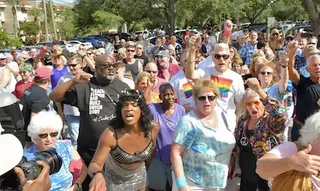July 17, 2013
ND Anti-Smoking Effort Targets Gay Pride Festival
Jason St. Amand READ TIME: 2 MIN.
A division of North Dakota's Health Department that aims to help smokers quit is putting $2,500 toward reaching people at a gay pride festival in Fargo later this summer, raising questions about whether public money should be used to support specific causes.
The expenditure, which comes from a state fund filled with money from a settlement with tobacco companies, covers the cost of setting up a booth and handing out brochures, as well as advertising in the F-M Pride's guide and on the group's website.
The money is not a sponsorship but a means to reach the gay, lesbian, bisexual and transgender population, which the federal Centers for Disease Control and Prevention says is 70 percent more likely to smoke than the general population, said Krista Fremming, director of the Health Department's Tobacco Control Program.
"We have a limited budget," she told The Forum newspaper (http://bit.ly/15HgbVX ). "What we want to do is reach the people who are most in need of our services. It's not just the LGBT community."
Other targeted populations include Native Americans, oil field workers and pregnant women who struggle with quitting tobacco, Fremming said. Officials attend up to 10 events each year, such as a women's health conference in Fargo and an expo for oil workers in Minot, she said.
North Dakota Policy Council Executive Director Zack Tiggelaar said he supports efforts to encourage smokers to quit but questions whether public money should be used.
"The government shouldn't be using taxpayer dollars to support specific causes. If the money was completely private and there were no public dollars at all, there would be no issue," he said.
State Rep. Joshua Boschee, D-Fargo, one of the organizers of next month's gay pride festival, said the event has partnered with other anti-smoking groups in the past.
"Would we rather the government pays for (such efforts) on the front end, or do we want to pay for it in the long run when Medicaid and Medicare are covering the costs" of treating people with smoking-related illnesses? he asked.




